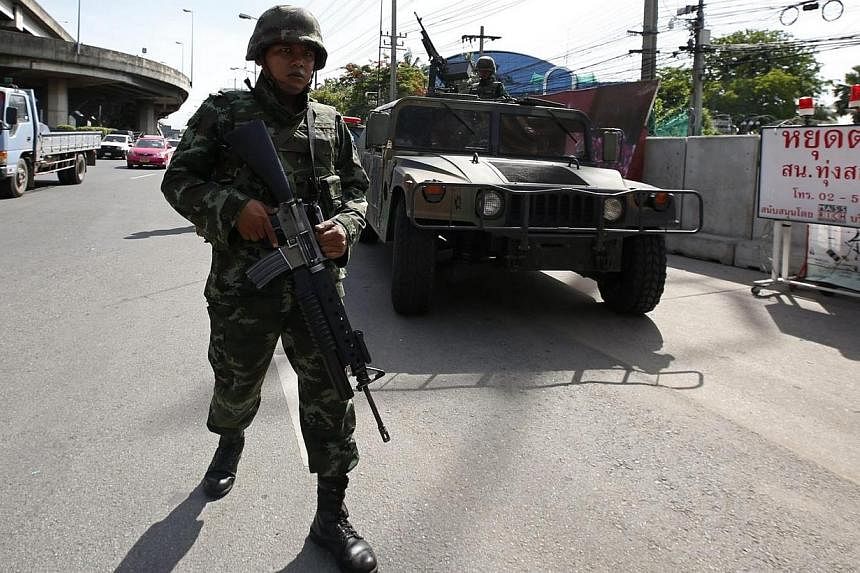Thai mainstream media on Tuesday greeted the imposition of martial law and ban on selected television channels with some sense of relief and hoped that this would mark a turning point in the prolonged period of uncertainty in the country.
Observers said that the move by the armed forces might well ensure a breakthrough between the two rival political groups. But, they added, there is also concern that the still-tense situation could lead to more violence in the country.
Months of political unrest have already left nearly 28 people dead and hundreds wounded.
Thailand's mainstream media was spared when the army shut down 10 satellite channels and directed all media to refrain from presenting news that could lead to political unrest, after martial law was imposed.
 Troops secured many of the affected television stations. The anti-government BlueSky and pro-government Asia Update were ordered to halt broadcasting pending further notice, The Nation newspaper reported. Other networks affected are ASTV, MV5, DNN, UDD, P&P, FourChannel, MFTV and Tnews. Illegal radio networks also ceased operations in accordance with the order.
Troops secured many of the affected television stations. The anti-government BlueSky and pro-government Asia Update were ordered to halt broadcasting pending further notice, The Nation newspaper reported. Other networks affected are ASTV, MV5, DNN, UDD, P&P, FourChannel, MFTV and Tnews. Illegal radio networks also ceased operations in accordance with the order.
"The government has suspended the 'coloured' television channels," Mr Pana Janviroj, president of The Nation newspaper told The Straits Times, referring to media that supported the red shirt or yellow shirt protesters. "The mainstream media is functioning as usual. Those that were neutral are not affected," he said.
Mr Pana said that there is a some "sense of relief" after martial law was imposed as the move is expected to put pressure on the two sides to reach some sort of an agreement, in the next few weeks, although a threat of further violence remains.
"The two sides will have to come to some sort of a compromise over an interim government. Every body will have to take a step back. There is opportunity now for a solution," he said.
"The nature of the compromise is still unclear. We could have a non-elected PM. Or, an elected PM. To Thai people, the personality of the individual matters. The government is still quiet. We have to see what they have to say. So far only Thaksin has been tweeting," he said, referring to former Thai Prime Minister Thaksin Shinawatra.
The nation's caretaker PM and Mr Thaksin's sister Yingluck Shinawatra resigned after the Constitutional Court found her and nine members of her government guilty of abuse of power in the illegal transfer of a civil servant.
The appointment of former Commerce Minister Niwatthamrong Boonsongphaisan to replace her, who was known to be close to Mr Thaksin, did not go down well with anti-government protesters who wanted the government to resign.
Consequently, there's been no easing of the uncertainty that has gripped the country for over six months now.
"The situation is still developing," said Mr Umesh Pande, Editor, Asia Focus, Bangkok Post. "There is a sense that the mouthpieces of the two sides have been taken care of in the censorship. And the reaction is so far so good. Everyone's watching," he told The Straits Times over phone.
"Mainstream media is not affected. But gradually there could be changes."


